汉语无主句的英译
无主句的翻译

3. 要广泛动员中小学生学习科普知识。
Primary school and high school students should be mobilized to learn popular science knowledge.
译为祈使句
1. 请勿践踏草坪!
Please keep off the lawn!
there be…句型
2. 没有顺利,无所谓困难;没有困难,也无所谓顺利。 Without facility, there would be no difficulty, without difficulty, there would also be no facility.
it be…+to…句型 1. 要成功就要付出劳动。 It will cost you much labor to succeed in anything. 2. 要是去参观那个展览会会很有意思。 It would have been amusing to have gone to the exhibition.
2.下雨了,咱们快走吧。
It’s raining now. Let’s get going.
5
用泛指癿人称代词填补主语
1. 活到老,学到老。 One is never too to learn.
2. 丌承认这一条真理,就丌是共产主义者。 Anyone who does not recognize this truth is no communists.
无主句癿翻译
BY:
定义:
汉语中,只有谓语而没有主语的句子叫做无主句。 这是汉语当中特有的一种句型。但所谓无主句,并 丌是“省略句”,而是在习惯上就那样讲,那样写 的;其主语是什么,往往行难断定;但是在任何环境 里它都能表达完整而明确的意思,如“下雨了”等 等。在英语里,句子一般都有主语,没有主语的情 况很少见。因此,汉语的无主句译成英语时,往往 要补出主语或改变句型,使句子结构符合英语语法 的特点。
汉语无主句的英译初探
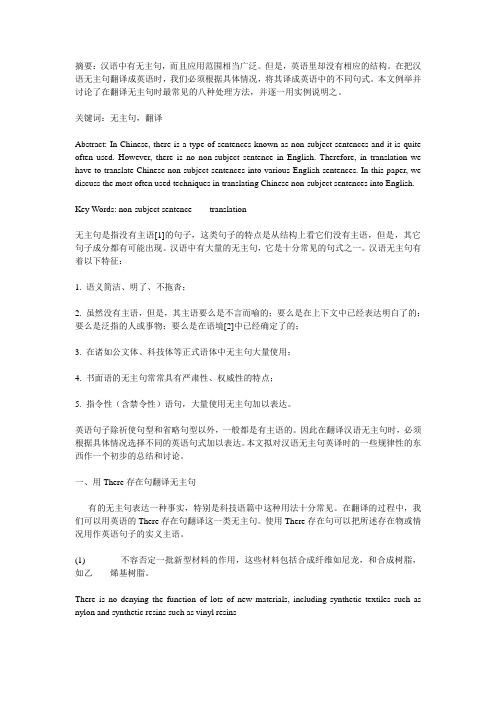
摘要:汉语中有无主句,而且应用范围相当广泛。
但是,英语里却没有相应的结构。
在把汉语无主句翻译成英语时,我们必须根据具体情况,将其译成英语中的不同句式。
本文例举并讨论了在翻译无主句时最常见的八种处理方法,并逐一用实例说明之。
关键词:无主句,翻译Abstract: In Chinese, there is a type of sentences known as non-subject sentences and it is quite often used. However, there is no non-subject sentence in English. Therefore, in translation we have to translate Chinese non-subject sentences into various English sentences. In this paper, we discuss the most often used techniques in translating Chinese non-subject sentences into English.Key Words: non-subject sentence translation无主句是指没有主语[1]的句子,这类句子的特点是从结构上看它们没有主语,但是,其它句子成分都有可能出现。
汉语中有大量的无主句,它是十分常见的句式之一。
汉语无主句有着以下特征:1. 语义简洁、明了、不拖沓;2. 虽然没有主语,但是,其主语要么是不言而喻的;要么是在上下文中已经表达明白了的;要么是泛指的人或事物;要么是在语境[2]中已经确定了的;3. 在诸如公文体、科技体等正式语体中无主句大量使用;4. 书面语的无主句常常具有严肃性、权威性的特点;5. 指令性(含禁令性)语句,大量使用无主句加以表达。
英语句子除祈使句型和省略句型以外,一般都是有主语的。
Unit 9 汉英对比与翻译(二)

Unit 9 汉语无主句的英译课时:2H教学目的要求:掌握汉语无主句的基本英译办法。
教学重点:翻译汉语无主句的几种技巧。
教学难点:如何使译文符合语法和语言使用规范。
教学内容:一、汉语祈使句译成英语祈使句1、起立!Stand up!2、请勿吸烟!No smoking!3、此处禁止停车!No parking!4、祖国万岁!Long live our motherland!二、采用英语的被动结构译出5、墙上挂了一些画。
Some pictures were hung on the wall.6、在合同中,详细地规定了双方必须履行的各种条件。
In the contract, all kinds of conditions which both sides should follow were laid down in detail.7、没有安定的政治环境,干什么都不成。
Nothing can be accomplished without a stable political environment.8、为什么总把这些麻烦事推给我呢?Why should all the unpleasant jobs be pushed on to me?三、采用倒装语序译出9、地下埋藏着大量的金、银、铜、铅和锌。
Hidden underground is a wealth of gold, silver, copper, lead and zinc.10、随着一声吼叫,呼地从树林里窜出一只老虎来。
Following the roar, out rushed a tiger from among the bushes.11、山里住着个虔诚的老和尚。
In the mountain lived an old devout monk.四、采用英语存在句there…be结构译出12、很多年以前,这个村子里住着六个盲人。
A long, long time ago, there lived six blind men in this village.13、剩下的时间不多了。
句法视角下的汉语无主句英译策略探析

句法视角下的汉语无主句英译策略探析本文旨在通过对句法视角下的汉语无主句英译策略的分析,探讨汉语无主句英译中存在的问题,并且提出相应的解决方案,以期达到英译更加准确、流畅的目的。
汉语无主句是汉语句子结构中的一种特殊类型,它没有谓语动词和句子的主语,具有明确的主旨,可以简洁地表达某种行为或思想。
然而,汉语无主句在英译过程中存在着一定的难点,其中最主要的有句法上的挑战、文化差异性的问题以及汉语表达的认知特点。
首先,汉语无主句的结构和英语句子的结构是不一样的,在汉语无主句英译时,往往不能完全照搬原文的句子结构,这就要求译者在翻译过程中要对汉语句子语义进行把握,并且调整句子结构,以达到英文表达的自然、流畅。
其次,由于来自不同文化背景的原因,汉语无主句的主旨信息一般只能在原文中推断出来,而英语句子必须明确表达主旨,因此,译者需要根据汉语无主句的语义特点,并结合原文中的对照信息以及上下文,合理调整英文句子的主语,以实现主旨的准确表达。
最后,汉语无主句倾向于用虚语,即以其他语言中所不存在的名词代替主语,例如以“人们”来代替“我们”,而英语中则缺乏这种表达方式,因此,译者在汉语无主句英译过程中需要根据上下文对汉语的认知特点,以及汉语的语义特点,把虚语转换为实语,以确保英文表达的准确性。
从上述探讨可以得出,汉语无主句英译的难点主要集中在句法上的挑战、文化差异性的问题和汉语表达的认知特点这三个方面。
因此,译者在进行英译汉语无主句时,需要对原文语义进行充分理解,结合原文的语境,正确调整句子结构,将原文语义表达准确地转换到英语中,以达到英译更加准确、流畅的目的。
此外,培养正确的英译习惯也是非常重要的,一个良好的英译习惯会帮助译者更加准确地理解原文,并在英译过程中更轻松的应用英语语法规范。
综上所述,汉语无主句英译是一个艰巨的任务,译者需要通过对句法视角下的汉语无主句英译策略的分析,熟悉英语语法规范,结合上下文调整句子结构,正确地理解汉语无主句的语义,以便将原文信息准确地表达出来。
7-汉语无主句的英译
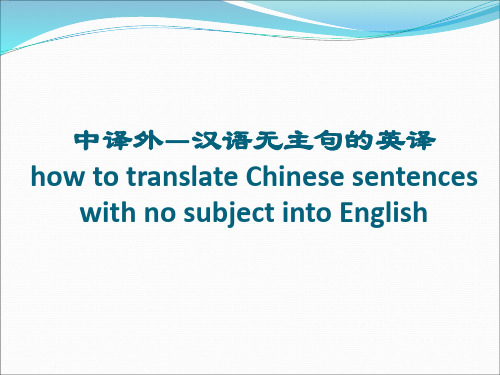
II. 增加主语
2. 增加 one, you, we, they, people 等作主语 1) 从太空观察地球,可以更深入地了解地球的构造,探 明地球的资源,预测地震、洪水、飓风、火山爆发、 海啸和其他自然灾害,可以保护人们的生命和财产。 探明资源(=勘探资源) explore resources 地震、洪水、飓风、火山爆发、海啸 earthquakes, floods, hurricanes, volcanic eruptions, tsunamis([su'nɑ:mi]) 自然灾害 natural disasters/calamities 注:catastrophe 大灾难, 程度比 disaster/calamity 深, 如 the catastrophe of a worldwide conflict
1) 人们的看法是旅游业将有助于促进中国人民和其 他国家人民之间的相互了解和友谊,并将有利于 文化、科学、技术方面的交流。还会有助于国家 增加收入。 The development of tourism, it is believed, will help promote mutual understanding and friendship between the peoples of China and other countries, and facilitate exchanges in the fields of culture, science and technology. Tourism also helps increase national revenue.
汉英翻译技巧无主句的翻译18页

二.采用“There+be…”,“It/one+be…+to…”等结 构
汉语中的某些格言、经验,或带有哲理的无主句,翻 译时一般都采用这类结构。例如:
(1)没有顺利,无所谓困难;没有困难,也无所谓顺利。
Without facility, there would be no difficulty; without difficulty, there would also be no facility.
(1)本剧场内禁止吸烟。
Smoking is not allowed in the theatre. (2) 发现了错误,一定要改正。
Wrongs must be righted when they are discovered.
(3) 必须保证八小时睡眠。
Eight hours’ sleep must be gu到老。
One is never too old to learn.
(3) 你忘记一句古话了吗:活到老,学到老。 何况你并不老。
Have you ever forgotten the old saying: one is never too old to learn. In any case, you’re not old at all.
五.选用适当的名词或代词补出主语
汉语无主句的英译,除上述几种方法外,还可以根据 上下文选用适当的名词或代词(包括人称代词和否定代
词)补出主语,构成一个完整的句子。例如:
(1)弄得不好,就会前功尽弃。
If things are not properly handled, our labor will be totally lost.
sd 汉译英 无主句的翻译

汉英翻译技巧
无主句的翻译
一. 译成被动句结构 二. 译成“There+be…”句型 三. 译成“It/one+be…+to…” 四. 译成倒装句 五.译成祈使句 六. 增补主语
汉语中,只有谓语动词而没有主语部分的句子叫做无 主句。 这是汉语中特有的一种句型。
汉语无主句的主要特征 汉语无主句的英译法
六. 增补主语
汉语无主句的英译,除上述几种方法外,还可以根
据上下文选用适当的名词或代词(包括人称代词和 否定代词)补出主语,构成一个完整的句子。例 如: (1)弄得不好,就会前功尽弃。 If things are not properly handled, our labor will be totally lost. (2) 知彼知己,百战不殆。 Know the enemy and know yourself, and you can fight a hundred battles with no danger of defeat. (3)只准州官放火,不准百姓点灯。 One man may steal a horse, while another may not look over the hedge.
练习4
4. 不冒点风险,办什么事情都有百分之百的把握, 万无一失,谁敢说这样的话? Who dares to claim that he is 100 percent sure of success right from the beginning and without taking any risk? There is no such thing as certainty.
中美两国的社会制度和对外政策有着本质的区别。但是,双方同意,各 国不论社会制度如何,都应根据尊重各国的主权和领土完整、不侵犯别 国、不干涉别国内政、平等互利、和平共处的原则来处理国与国之间的 关系。国际争端应在此基础上与以解决,而不诉诸武力和武力威胁。 There are essential differences between China and the United States in their social systems and foreign policies. However, the two sides have agreed that countries, regardless of their social systems, should conduct their relations on the principles of respect of the sovereignty and territorial integrity of all states, non-aggression against other states, non-interference in the internal affairs of other states, equality and mutual benefit, and peaceful coexistence. International disputes should be settled on this basis, without resorting to the use or the threat of force.
无主句的翻译

It is used to emphasize certain parts, and words like just, only often lead such nonsubject sentences.
1.正是为了减少摩擦力才把机器部件上了油。 It is for the purpose of lessening friction that we oil the machine parts. 2.就是只有在使用雷达时,才能把远距离的轮廓显 示在接收机的荧光屏上。 It is only when radar is made use of that the outlines of distant objects can be shown on the viewing screen of the receiver.
Continue:
积极推广以互信互利、平等写作为核心的新型安全观 We should advocate the new security concept with mutual confident, mutual benefit and equitable cooperation as the core. 在这里,可以听到最荒唐的新闻,如某处的大蜘蛛怎么成 了精,受了雷击。 In the teahouse one could hear the most absurd stories, such as how in a certain place a huge spider had turned into a demon and was then struck by lightening. 只准州官放火,不准百姓点灯。 One man may steal a horse, while another may not look over the hedge.
无主句的翻译
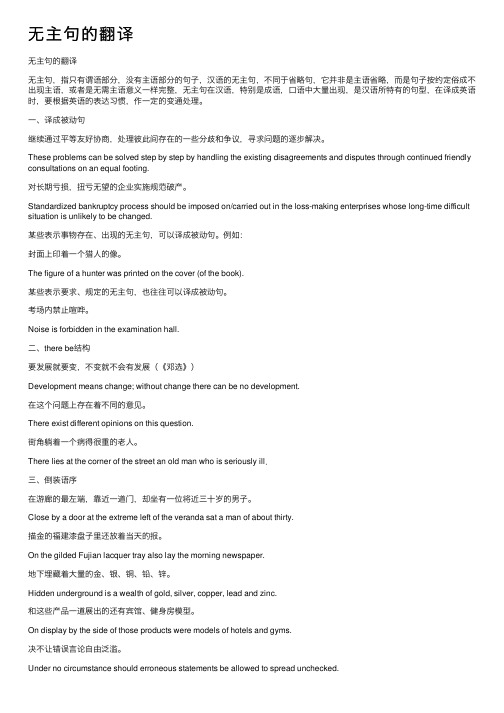
⽆主句的翻译⽆主句的翻译⽆主句,指只有谓语部分,没有主语部分的句⼦,汉语的⽆主句,不同于省略句,它并⾮是主语省略,⽽是句⼦按约定俗成不出现主语,或者是⽆需主语意义⼀样完整,⽆主句在汉语,特别是成语,⼝语中⼤量出现,是汉语所特有的句型,在译成英语时,要根据英语的表达习惯,作⼀定的变通处理。
⼀、译成被动句继续通过平等友好协商,处理彼此间存在的⼀些分歧和争议,寻求问题的逐步解决。
These problems can be solved step by step by handling the existing disagreements and disputes through continued friendly consultations on an equal footing.对长期亏损,扭亏⽆望的企业实施规范破产。
Standardized bankruptcy process should be imposed on/carried out in the loss-making enterprises whose long-time difficult situation is unlikely to be changed.某些表⽰事物存在、出现的⽆主句,可以译成被动句。
例如:封⾯上印着⼀个猎⼈的像。
The figure of a hunter was printed on the cover (of the book).某些表⽰要求、规定的⽆主句,也往往可以译成被动句。
考场内禁⽌喧哗。
Noise is forbidden in the examination hall.⼆、there be结构要发展就要变,不变就不会有发展(《邓选》)Development means change; without change there can be no development.在这个问题上存在着不同的意见。
汉语无主句的英译

一、汉语祈使句译成英语祈使句
1、起立!
Stand up!
2、请勿吸烟!
No smoking!
3、此处禁止停车!
No parking!
4、祖国万岁!
Long live our motherland!
二、采用英语的被动结构译出
5、墙上挂了一些画。
Some pictures were hung on the wall.
It’s blowing, it’s raining.
17、出太阳了。
The sun is rising. (从东方升起,不用it)The sun appears.(可能从乌云中露出,不用it )
18、天阴了。
It’s cloudy.(尽管汉语中用了有主语句,“天”为主语,到英语里仍为it,很少用the sky is cloudy.)
In order to solve the problem it is necessary to make a systematic and thorough investigation and study.
22、与自然作斗争,备感快乐。
It is a great joy to battle against nature.
3、那个地方讲什么方言?
What language is spoken there?
4、去年发现了一种稀有元素。
A rare element was found last year.
5、饿得他话都说不出来了。把他饿得说不出话来了。
It makes him so hungry that he can’t speak. He is too hungry to speak.
汉语无主句的翻译讲解学习

Wrongs must be righted when they are discovered. (3) 必须保证八小时睡眠。 Eight hours’ sleep must be guaranteed.
达。
(新编汉英翻译教程,2004;129)
汉语无主句的英译法大致有以下几种
运用英语的被动结构 译成英语的存在句there be 运用倒装句式 采用祈使句式 采用形式主语it 适当主语的增补 具体问题具体对待
一.运用英语的被动结构
(一)某些表示事物存在、出现的无主句, 可以译成被动句。例如:
无主句不同于主谓句中省略主语或者隐含主语 的句子,它的主语往往是不确定的,如“上课 了!”或者根本无法补充出主语,如“下雨 了。”
英语中,句子一般都要有主语,没有主语是例 外。因此,汉语的无主句译成英语时,往往需 要补出主语或改变句型,使句子结构符合英语 语法的规范。
汉语中有大量的无主句,它是十分常见的句式 之一。汉语无主句有着以下特征:
语态选择中注意以下这两点
有一些动词和词组不能用于被动语态。它们是: come true,consist of,take place,happen, become,rise,occur,belong,break out, appear,arrive,die,fall,last,exist,fail, succeed等。
1)剩下的水不多了。 There is very little water left.
2)萝卜青菜,各有所爱。 There is no accounting for taste.
3)无水则无鱼。 Without water there would be no fish.
第八章 汉语无主句的翻译

第八章汉语无主句的翻译翻译汉语无主句,可根据上下文添加主语,也可转换句子结构,译为英语中的被动句、“There be”句型、倒装句或祈使句。
一、译为被动句无主句中动词带有宾语,而且宾语比较短小,可以译为英语的被动句,利用汉语原句中的宾语作为被动句的主语。
1. 有效保护儿童权利。
The right of children should be effectively protected.2. 继续改善居民住房条件。
Housing conditions should be continuously improved.3. 进一步深化国有企业改革。
Reform of State-owned enterprises will be deepened.4. 支持、鼓励和引导私营、个体企业尤其是科技型中小企业健康发展。
The sound development of privateenterprises, especially small and medium-sized science and technology enterprises, will be supported, encouraged and guided.5. 继续通过平等友好协商,处理彼此间存在的一些分歧和争议,寻求问题的逐步解决。
These problems can be solved step by step by handling the existing disagreements and disputes through continued friendly consultations on the equal footing.6. 对长期亏损,扭亏无望的企业实施规范破产。
Standardized bankruptcy processes should be imposed on/carried out in the lossing-making enterprises whose long-time difficult situation is unlikely.7. 必须推进以德育为核心,以创新精神和实践能力为重点的素质教育。
无主句的翻译
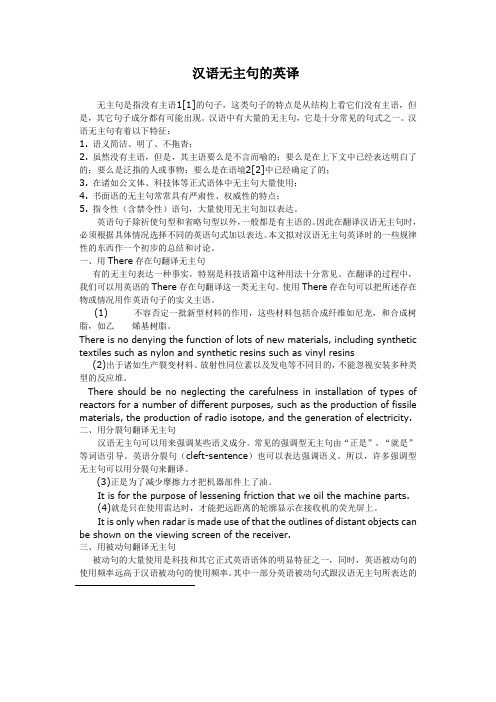
汉语无主句的英译无主句是指没有主语1[1]的句子,这类句子的特点是从结构上看它们没有主语,但是,其它句子成分都有可能出现。
汉语中有大量的无主句,它是十分常见的句式之一。
汉语无主句有着以下特征:1. 语义简洁、明了、不拖沓;2. 虽然没有主语,但是,其主语要么是不言而喻的;要么是在上下文中已经表达明白了的;要么是泛指的人或事物;要么是在语境2[2]中已经确定了的;3. 在诸如公文体、科技体等正式语体中无主句大量使用;4. 书面语的无主句常常具有严肃性、权威性的特点;5. 指令性(含禁令性)语句,大量使用无主句加以表达。
英语句子除祈使句型和省略句型以外,一般都是有主语的。
因此在翻译汉语无主句时,必须根据具体情况选择不同的英语句式加以表达。
本文拟对汉语无主句英译时的一些规律性的东西作一个初步的总结和讨论。
一、用There存在句翻译无主句有的无主句表达一种事实,特别是科技语篇中这种用法十分常见。
在翻译的过程中,我们可以用英语的There存在句翻译这一类无主句。
使用There存在句可以把所述存在物或情况用作英语句子的实义主语。
(1) 不容否定一批新型材料的作用,这些材料包括合成纤维如尼龙,和合成树脂,如乙烯基树脂。
There is no denying the function of lots of new materials, including synthetic textiles such as nylon and synthetic resins such as vinyl resins(2)出于诸如生产裂变材料、放射性同位素以及发电等不同目的,不能忽视安装多种类型的反应堆。
There should be no neglecting the carefulness in installation of types of reactors for a number of different purposes, such as the production of fissile materials, the production of radio isotope, and the generation of electricity.二、用分裂句翻译无主句汉语无主句可以用来强调某些语义成分。
无主句的英译[精华]
![无主句的英译[精华]](https://img.taocdn.com/s3/m/96958131a4e9856a561252d380eb6294dd882290.png)
汉译英汉语无主句的英译1. 通常六点半开灯。
The lights are usually turned on at 6:30.2. 继续改善居民住房条件。
Housing conditions should be continuously improved.3. 处处有热心人。
There are warm-hearted people everywhere.4. 到什么山上唱什么歌。
Sing different songs on different mountains.5. 打得赢就打,打不赢就走。
Fight when you can win, move away when you cannot.6. 要在工作中获得成功,就必须有耐心。
One must be patient if one wants to win success in work.7. 墙上挂了一些画。
Some pictures were hung on the wall.什么叫无主句?▪在汉语中,只有谓语而没有主语部分的句子叫无主句(非主谓句)。
▪但无主句,并不是省略了主语的句子,汉语中省去主语的句子属于“省略句”。
▪汉语无主句本身是完整的,不必补上什么,但意义一目了然。
▪汉语省略句由于一定的语言环境省略了某个成分,需要时可以准确地补出来。
▪例如,对话时,一个人说“别玩火”!▪这个祈使句是省略主语的主谓句,可以补出主语“你”或“你们”。
▪而公共场所所写的“ 禁止烟火!”(No burning! 或No Smoking!)▪这个句子本身是完整的,不必补出什么成分。
汉语中存在着大量的无主句。
据相关统计,汉语中所谓主谓句和非主谓句各占一半。
文言文中主谓句还要少。
▪可是在英语里,句子一般都要有主语,没有主语是例外。
汉语存在大量无主句的成因:▪英语重形合,属语法型,语法形式是显性的,句子有严谨的主谓结构。
而汉语重意合,属语义型,语法形式是隐性的,句子注重意念连贯,不求结构完整。
26无主句的翻译

无水则无 Without water there would be no fish. 好多年以前,这个村子里住着六个盲人。 A long, long time ago, there lived six blind men in this village.
萝卜青菜,各有所爱。
There is no account for taste.
25
这几天心里颇不宁静,今晚在院子里坐着乘凉, 忽然想起日日走过的荷塘……
I have felt quite upset recently. Tonight, when I was sitting in the yard enjoying the evening cool, suddenly occurred to me the Lotus Pond around which I lingered everyday…… 白天里一定要做的事,一定要说的话,现在都可 不理。 All that one is obliged to do, or say, in the daytime, can very well be cast aside now. 26
只准州官放火,不准百姓点灯。
The magistrates are free to burn down houses, while the common people are forbidden even to light lamps.
在那桃花盛开的地方,有我可爱的故乡。
My lovely hometown lies (in the place) where peach flowers are in blossom.
不能不佩服他多年来埋头苦干的精神。
One cannot but admire his perseverance in keeping his nose to the grindstone for all these years.
汉语无主语句

汉语无主语句汉语无主句翻译成英文汉语无主句翻译成英文1 翻译为被动语态。
1.1 采用It is v-ed that 从句形式。
1)估计需要十万元。
It is estimated that it will cost 100,000 RMB.2) 据说双方已经同意达成一个解决方法。
It is said that both sides have agreed to a solution./Both sides are said to have agreed to a solution.3) 据推测,该公司下个月就将在中国投资。
It is supposed that this company will invest in China next month.1.2 直接被动1) 那地方讲英语。
English is spoken there.2) 发现了错误,一定要改正。
Errors should be corrected when they are discovered.3) 给了他两天时间来做必要的准备。
Two days have been allowed him for making the necessary preparation.4) 合同中,详细地规划了双方必须履行的各种条件。
In the contracts, all kinds of conditions which two sides shouldfollow have been laid down in detail.5) 进一步深化国有企业改革。
The reform of stated-owned enterprises will be further carried out.6) 鼓励国内有比较优势的企业到境外投资办厂。
State enterprises with comparative advantages should be encouraged to make investments abroad and set up factories.(注意此句,我开始就选择把境外投资办厂作为了主语,但是导致主语过长很不符合英语习惯,看来被动语态的主语选择也很有学问!!!)以下几句均是宾语较长,或者有几个宾语,那么就要选择原句的中心词来充当主语。
汉语无主句的翻译

二、运用适当 的名词或代词 补出主语
汉语重意合,是话题凸显 的语言;英语重形和,是 主语凸显的语言。
• 凭窗站了一会儿,微微地 觉得凉气袭人。 • Standing at the window, I felt a bit chilly. • 没有受过恋爱洗礼的人生, 不能算是真正的人生。 • One who has never gone through the baptism of romantic love will have little knowledge of life.
It + be···+to 结构翻译
必须承认······ it must be admitted that··· 必须指出······ it must be pointed out that··· 大家知道······it is well ······it known that ··· 据报道······ it is reported that ··· 希望···it is ewill be seen from this that···
运用倒装语序
• 世界上还没有写出过这样一篇短篇小说。 • Never in the world was there written such a story. • 做现场唯一的保安官员还真有点危险。 • Perilous was to be the only security officer on the site.
• 宁为玉碎,不为瓦全。 • It is better to die when life is a disgrace. • 年轻人在位学问打根底之 际恐怕不能过分重视趣味。 • It is improper, I am afraid, for young people to overstress the importance of interest while they are still in the period of learning the basics of knowledge.
汉英翻译第九讲无主句的翻译
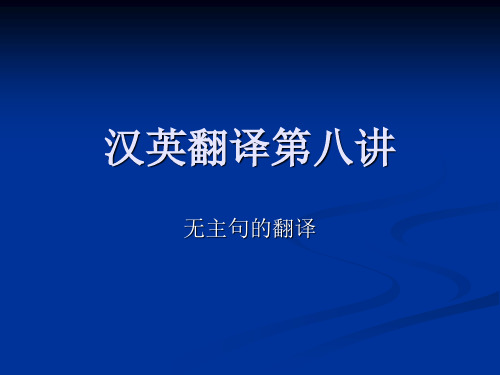
无主句的翻译
汉语中,只有谓语动词而没有主语部分的句子叫 做无主句。这是汉语中特有的一种句型。但所谓 无主句,并不是省略了主语的句子(汉语中省去 主语的句子属于“省略句” 主语的句子属于“省略句” ),而是在习惯上就 那样讲、那样写的;其主语到底是谁,是什么, 往往很难断定;但是在任何语言环境里它都能表 达完整和明确的意思,如:“下雨了” 达完整和明确的意思,如:“下雨了”,“楼前 栽了两棵松树” 栽了两棵松树”,“村子里呈现出一片新的气象” 村子里呈现出一片新的气象” 等等。在汉语里,这种无主句比比皆是。可是在 英语中,句子一般都要有主语,没有主语是例外。 因此,汉语的无主句译成英语时,往往需要补出 主语或改变句型,使句子结构符合英语语法的规 范。 汉语无主句的英译法大致有以下几种:
(4) 究竟能不能巩固呢? Is it possible to consolidate them? (5) 你忘记一句古话了吗:活到老,学到老。 何况你并不老。 You are forgetting the old saying: one is never too old to learn. In any case, you’re not old at all. you’ 例(2 例(2)的译法,实际上是借用英语中寓义 相近的谚语。此种译法,也可以看作无主 句中格言,谚语英译的方法之一。
练习题: 采用适当的方式翻译下列无主句: 不忘阶级苦! 忠诚党的教育事业。 一有问题就去解决,不要等问题成了堆才去作一 次总解决。 不入虎穴,焉得虎子。 我身边的桌子上点着一盏灯,灯旁放着一只小盒 子。 必须认真地做好建厂以前的准备工作。 那地方讲什么语言? 为什么要有革命党?
前头坐着一位老人。 不努力便不会成功。 能不能提前完成计划呢? 没有矛盾,就没有世界。 厂里有一条制度,每天夜里各单位都要有一名干 部值班。 突然钻出一只狗,追着她咬,几乎把她吓糊涂了。 以下是代表的名单。 以其人之道,还治其人之身。 留得青山在,不怕没柴烧。 有人敲门。 屋内悄无一人,只听见钟在滴滴答答地走着。 上半夜由他值班,下半夜我来值班。
Non-Subject Sentences

例6 .It is your best choice
to take the tonic on an empty stomach.
译:最好空腹服此补品
英语中有一些招牌用语、包装物的指示 说明等都有着约定俗成的说法。
例7. Right side up. 译:此端向上 (除此之外还有Hands off“请勿动手”、
Non-Subject Sentences
1~5 汉语无主句翻译 6~10 英语无主句翻译
汉语无主句
例1. 出于诸如生产裂变材料、放射性同 位素以及发电等不同目的,不能忽视安 装多种类型的反应堆. 基本句式:(出于…目的,不能….) 显然句中是没有主语的。
方法1:利用There be句型翻译
There should be no neglecting the
of the Anti-Japanese War.
译:接着是八年抗战。
例10:It seems that Jack’s
idea is more practical.
译:看起来 杰克的意见更实际 一些。
Thank you!
For external use only “严禁内服”)
英语祈使句中许多都是无主句
例7. Get prepared for your
examination.
译:好好准备考试。 例8 .Leave it alone. 译:放开它。
英语中的部分倒装句为无主句
例8:There goes the bell. 译:铃响了。 例9:Then followed eight years
方法2:用被动句翻译无主句
例2. 房子盖在西院。 译:பைடு நூலகம்he house is built in the west yard.
- 1、下载文档前请自行甄别文档内容的完整性,平台不提供额外的编辑、内容补充、找答案等附加服务。
- 2、"仅部分预览"的文档,不可在线预览部分如存在完整性等问题,可反馈申请退款(可完整预览的文档不适用该条件!)。
- 3、如文档侵犯您的权益,请联系客服反馈,我们会尽快为您处理(人工客服工作时间:9:00-18:30)。
汉语无主句的英译
一、汉语祈使句译成英语祈使句
1、起立~
Stand up!
2、请勿吸烟~
No smoking!
3、此处禁止停车~
No parking!
4、祖国万岁~
Long live our motherland!
二、采用英语的被动结构译出
5、墙上挂了一些画。
Some pictures were hung on the wall.
6、在合同中,详细地规定了双方必须履行的各种条件。
In the contract, all kinds of conditions which both sides should follow were laid
down in detail.
7、没有安定的政治环境,干什么都不成。
Nothing can be accomplished without a stable political environment.
8、为什么总把这些麻烦事推给我呢,
Why should all the unpleasant jobs be pushed on to me? 三、采用倒装语序译出
9、地下埋藏着大量的金、银、铜、铅和锌。
Hidden underground is a wealth of gold, silver, copper, lead and zinc.
10、随着一声吼叫,呼地从树林里窜出一只老虎来。
Following the roar, out rushed a tiger from among the bushes.
11、山里住着个虔诚的老和尚。
In the mountain lived an old devout monk。
四、采用英语存在句there…be结构译出
12、很多年以前,这个村子里住着六个盲人。
A long, long time ago, there lived six blind men in this village.
13、剩下的时间不多了。
There is very little time left.
14、萝卜青菜,各有所好。
There is no accounting for taste.
15、没有顺利,无所谓困难;没有困难,也无所谓顺利。
Without facility, there would be no difficulty, without difficulty, there would also
be no facility.
五、采用it作主语译出
16、刮风了,下雨了。
It’s blowing, it’s raining.
17、出太阳了。
The sun is rising. (从东方升起,不用it)The sun appears.(可能从乌云中露出,不用it ) 18、天阴了。
It’s cloudy.(尽管汉语中用了有主语句,“天”为主语,到英语里仍为it,很少用the sky is cloudy.)
19、热得他们全身冒汗。
It’s so hot that they are sweating like a pig.
20、累得我走不动了。
It makes me so tired that I can’t walk any more.
21、要解决问题,还必须做系统、周密的调查工作和研究工作。
In order to solve the problem it is necessary to make a systematic and thorough
investigation and study.
22、与自然作斗争,备感快乐。
It is a great joy to battle against nature. 23、活到老,学到老。
It is never too old to learn.
24、要成功,就要付出劳动。
It will cost you much labor to succeed in anything. 六、增添人称代词或名词充当主语
25、弄得不好,就会前功尽弃。
If things are not properly handled, our labor will be totally lost.
26、不入虎穴,焉得虎子。
If one does not enter the tiger’s den, how can he get a tiger’s cub?
27、不能不佩服他多年来埋头苦干的精神。
One cannot help but admire the way he has kept his nose to the grindstone for all
these years.
28、不努力便不会成功。
One can never succeed without making great efforts. 29、只要知道电压和电流就能够确定电阻。
Knowing the voltage and current, you (we) can determine the resistance.
Exercise:Please translate the following into English. 1、请讲慢些。
Speak a little slower, please.
2、这儿将修建更多的居民大楼。
More apartment houses will be built here. 3、那个地方讲什么方言, What language is spoken there?
4、去年发现了一种稀有元素。
A rare element was found last year.
5、饿得他话都说不出来了。
把他饿得说不出话来了。
It makes him so hungry that he can’t speak. He is too hungry to speak.
6、能不能提前完成计划呢,
Is it possible to carry out the plan ahead of time? 7、到车站只有三英里路。
It is only three miles to the station.
8、这时寂静无声。
It is very quiet at the moment.
9、屋里有一位客人。
There is a guest in the room.
10、想吃什么,只管告诉我。
Whatever you like to eat, just tell me.
11、只有慎之又慎,才能避免犯不必要的错误。
Being very careful, you (we) can avoid making unnecessary mistakes.
12、打得赢就打,打不赢就走。
Fight when you can win, move away when you cannot.。
